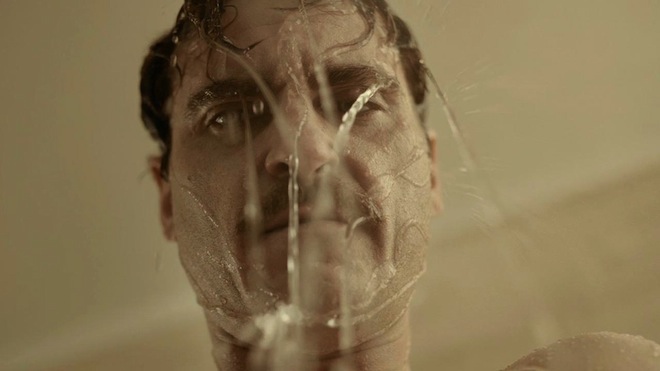Spike Jonze’s Underwhelming Her
09.01.14

Spike Jonze’s new film, Her, the first of his features for which he wrote his own original screenplay, is hampered by the writing. It fails to satisfactorily and convincingly develop a promising metaphorical premise: in a near-future version of Los Angeles, a lonely man, Theodore Twombly (played by Joaquin Phoenix), who works for a company ghost-writing phony “handwritten” letters for strangers and is trying to get over a painful divorce, buys an Operating System (OS), a new type of computer that comes with a unique and constantly developing consciousness, and falls in love with it (her), played in voice only by Scarlett Johansson.
The premise is almost on-par with that of the terrifically idiosyncratic scripts of Jonze’s repeat collaborator, Charlie Kaufman (Being John Malkovich, Adaptation), but the under-developed dopiness of Phoenix’s character and the corny sentimentality of Twombly and the OS’s relationship, and especially the awkwardness of the execution when Jonze tries to bring sexuality and jealousy into the relationship, is unconvincing, despite Phoenix’s formidable screen presence and the smart decision to cast Johansson as the OS.
I cringed in embarrassment during some of the dialogue. Additionally, the subplot with Amy Adams as Twombly’s long-time friend in a failing marriage adds little to the movie. Perhaps the most compelling supporting performance is Rooney Mara as Twombly’s ex-wife, and the few emotionally charged minutes of her face-to-face again with Twombly to sign divorce papers and her sporadic appearances in flashbacks drew me in more than the central relationship of the film.
The main positive of the film is the production design. I like Jonze’s vision of a slightly technologically enhanced, vaguely more utopian-seeming (but subtly unsettling) version of our current world. Jonze manages to make his brightly colored, slick but not-Star Trek-y near-future world look kind of appealing but also kind of like a totally immersive Apple commercial, which seems apt.
What is also interesting to think about is the accusation raised by Twombly’s ex-wife that he wants an affectionate relationship without the hard business of dealing with a fully unpredictable breathing human person, but this idea could have been developed into a sharper implied critique with some script rewrites.
Another thing: Jonze shows Twombly on an alienating date with an overbearingly insecure woman (Olivia Wilde), perhaps hoping to engender sympathy for his singledom and to justify his attraction to his OS, but there is no reciprocal scene or thread to lay bare Twombly’s flaws. Why should we care about this man’s plight? Phoenix is a very compelling, unpredictable actor, but he’s been given an underwhelming character.
This movie seemed too ~nice~ to me. I felt like it never fully exploited the potential of the vulnerable, arguably pathetic Twombly, nor the alien-like nature of a computer with a consciousness. Maybe the most creative idea in the movie is when the OS finds a human volunteer to stand in for her as a sex surrogate, providing the body, the face, the eyes, while the OS provides the voice for this vicarious encounter. But that scene ends awkwardly and unconvincingly as well. It seems as if Jonze, having come up with his ideas and the world to contain it and the people (and computer) to act it out, couldn’t quite get the execution right.
Lying in bed with his handsome, odd face bathed in the light of a gorgeous future-L.A. skyline, speaking intimately, like in Gchats, to a new but suddenly so familiar virtual friend, Phoenix is playing out a version of a contemporary reality full of potential humor, sadness, and pathos. It is the surrogate friend or lover that can become more than a surrogate, the digital that can become human or “real.” It is one of the new kinds of realities. Despite this potential for insight, Jonze’s movie felt to me about as bathetic as the phony “handwritten” letters Twombly writes at his job.